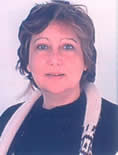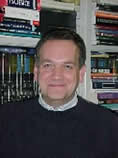A Six-Week ON-Line Course - TESOL EVONLINE 2005 - Jan 17-Feb 26
Meet the Guest Lecturers
|
Making
the Transition from ESL to ESP
A Six-Week ON-Line Course - TESOL EVONLINE 2005 - Jan 17-Feb 26 Meet the Guest Lecturers |
| Margaret van Naerssen: Week 1 - Jan 17 - 23: | |||
|
|
Currently part-time faculty at the Graduate School of Education, University
of Pennsylvania and part-time faculty at Immaculata University and coordinator
of the MA and certificate programs in TESOL. Her consultant work includes
work for the Educational Testing Services, U.S. Department of State, and
as an expert consultant/ witness in forensic linguistics. |
||
| Debra S. Lee: Week 2- Jan 24 - 30 | |||
|
|
Hi, I'm Debra Lee from Nashville, Tennessee, USA. Right now, I'm on From reading the bios of the participants, I know that I have a lot to learn from everyone, which is the wonderful thing about teaching-we are always learning. I started my TEFL work in ESP because I came at TEFL backwards.
I studied law first, and then, years later, got an M.A. in TEFL. This
has caused me to be interested in the question of "how much do you Debby |
||
| Mary Ellen Kerans: Week 3 - Jan 31 - Feb 6 | |||
|
|
Mary Ellen Kerans has been teaching ESL or EFL, mostly in Barcelona,
since she received her MA in TESOL from Teachers College Columbia University
in 1978. Her transition to ESP took place seamlessly through workplace
classes in Barcelona in the 1980s, partly as a natural consequence of
teaching philosophy—that learners’ needs and interests need
to be considered in lesson plans and curricula. Market demands in Spain
soon led to focus on another area of ESP—scientists’ need for
help in writing and revising articles for peer review. Mary Ellen’s
background as a writing teacher meant that author’s editing for writing
scientists and teaching, when needed, were blended. Soon she was writing
autonomous learning ESP materials for publication in weekly magazines
sent to doctors and pharmacists. Mary Ellen has been part of an ESP team teaching dentistry, nursing and physical therapy students at the Universitat Internacional de Catalunya since it opened in 1998. Her most recent projects are the development of an online writing tutorial and author’s editing course to be hosted by the Universitat Oberta de Catalunya and the design and implementation of a translator training and quality assurance protocol for monthly cover-to-cover translation of an open access scientific journal. |
||
| Dafne Gonzalez: Week 4 - Feb 7 - 13 | |||
 |
Dafne Gonzalez (Daf) has been an EFL, EST and ESP professor
for more than 30 years in Caracas, Venezuela. She has also taught methodology
and research methods courses in a MSc in an Applied Linguistics Program
at Universidad Simon Bolivar, where she is an Associate Professor.
She has been involved in online teaching since 2002. Dafne has published articles in different international journals, and has presented at TESOL conferences, and at online and f2f e-learning events. She is an active member of Webheads in Action, and one of her research interests is the use of synchronous web tools for language learning and teacher development, and she has created a taxonomy of educational chats. She is also a member of Tapped In and the Learning Times community. Dafne Gonzalez earned a B.A. in Modern Languages, a MSc in Applied Linguistics, and has just finished her doctoral studies in Spain. She serves on TESOL's Technology Advisory Commitee and Electronic Village Online Cordination team, and on the Editorial board of the ESL MiniConference Online Magazine. To learn more about her work, visit her (not recently updated) web page at http://www.geocities.com/dygonza/index.html |
||
|
Adam
Turner: Week 4 -
Feb 7 - 13
|
|||
|
|
I was probably asked to moderate one of the weeks in this class probably
because I am a good example of an EFL teacher who has been thrown into
(or have thrown myself into) ESP teaching without any specific training
or background. I started out teaching a general writing course which included
TOEFL writing and argumentative essays as well as resume writing etc.
However, I found a surprising number of graduate students in my class.
After checking around and doing some informal research, I realized that
there was an incredible lack of support for graduate students such as
engineers who had to publish Journal articles in English. To make a long story short, I have started a brand new graduate writing
class in a different department every term for the past couple of years.
It has been both rewarding and exhausting. I also made a proposal to start
a writing center at my university, which was accepted. It is the first
specifically for English writing in Korea http://ctl.hanyang.ac.kr/learning/writingcenter.html.
Now I work one on one with graduate students and faculty to help them
revise their English papers for publication. In addition, I teach one
graduate writing class per term. I also participate in a number of areas of professional development through
Korea TESOL. This includes facilitating a writing and editing Special
Interest Group through KOTESOL, the local Korean affiliate of TESOL, which
I started a couple of years ago. My presentations have been at National
and Regional KOTESOL conferences as well as affiliated Korean Teacher's
associations. They are usually on Writing or CALL topics and have included
Mnemonics for language learning (memory techniques), designing more effective
online quizzes, a blended learning approach to curriculum design for writing
classes, advanced software functions for aiding the writing process, and
Korean and English Contrastive Rhetoric: cultural differences in organizing
the essay. This is my sixth year in Korean and my hobby these days is Traditional Korean Archery. The target is 145 meters away! Adam Turner |
||
| Thomas Orr: Week 5 - Feb 14 - 20 | |||
 |
Thomas Orr, PhD, is Professor in the Center for Language Research in the School of Computer Science and Engineering at the University of Aizu in Japan, where he researches and teaches the academic and workplace English of computing and related fields. He has taught English to native and nonnative speakers in the United States and Japan for over 20 years, published and/or presented over 100 papers, and regularly provides reviews or consulting for several academic journals, societies and institutions. He is former Chair of TESOL's ESP Interest Section, founder of the Japan Conference on English for Specific Purposes, Chair of the Tokyo-Kanetsu ESP SIG of the Japan Association for College English Teachers, and Associate Editor of the IEEE Transactions on Professional Communication for articles on ESP/EST and International Communication. Other projects, include a book on needs assessment which he is currently completing for Cambridge University Press. |
||
| Anne Lomperis: Week 6 - Feb 21 - 27 | |||
|
|
Anne Lomperis began her career in the mid-70s working in English training for refugee resettlement, primarily with Southeast Asians, then, after the Mariel Boat Lift in 1980, with Cubans and Haitians. While initial concerns were to teach Coping Skills English for everyday integration into the US, this soon sharpened into a focus on English for jobs. Thus, her beginnings in workplace language training date to her first consultation in 1982 for a school district in Ft. Lauderdale, Florida, that had been called by the local Marriott to help teach English to an influx of Haitians in its Housekeeping Department. Over the last 23 years of specializing in Language for Occupational Purposes (LOP, broader than just EOP), Anne has worked in almost all industry sectors (i.e., service, manufacturing, primary, government, and nongovernmental organizations) in many regions of the world. The countries where she has served include the US, the Caribbean, Costa Rica, Colombia, Venezuela, the Philippines, Thailand, Russia/Siberia, Egypt, Turkey, Bahrain, and most recently, India (where, coincidentally, she was also born and raised through high school graduation). When she first started out in the hospitality industry of South Florida, she was awarded a national demonstration grant from the Ford Foundation, who had funded an earlier study she had conducted for them on the effectiveness of ESL programs for refugees throughout the US. She designed the Florida grant with partners from education, social services, and hotels. This led to setting up a program within the public school adult education division to teach English in hotels on a longer term basis. She contacted properties, marketed the program, conducted needs assessment, developed the curriculum, and taught the classes. As the program grew, she trained other teachers and oversaw the program. Throughout her subsequent career, she has always been concerned about the critical need for teacher training and building up the professionalism of LOP, in general. In a global economy, the demand for multiple language capability in the labor force is only increasing, yet the language training profession does not have qualified trainers in the pipeline to meet this demand. Thus, the well-intentioned, or ill-intentioned, unprofessional fills the gap. We have a pressing agenda for teacher training around the world. As part of her interest in professionalization, Anne helped found the ESP Interest Section of TESOL in 1992 and served as the EOP Representative to the Steering Board for two double, start-up terms. In this capacity, she initiated a 9-year effort to develop international Best Practices, or standards, for Workplace Language Training. Margaret van Naerssen, another of the EVO guest lecturers, also served on the Workplace Standards Task Force as a co-chair. In 1995, Anne founded the Language Training Forum (LTF) of the American Society for Training and Development (ASTD) and initiated a parallel effort on behalf of Best Practices within the LTF. Through her connections in the training field and all her work with corporations, she is also concerned about the need to educate our clients, particularly about sound program design. An effective tool for working with clients that she has also begun to develop is documentation of cost-benefit analysis and return on investment of LOP programs. Taking a wider view, Anne has most recently expanded her focus to language planning and language policy (LPLP) for economic growth in developing countries. She has begun working with ministries of education and labor, with educational institutions, and with priority industry sectors for national economic development. While she holds an MA in TESL from the University of Illinois-Urbana/Champaign, she is seeking a program in which she can pursue a PhD in LPLP. (On a personal note, she would just like some financial stability in her life to unpack her bags and grow orchids). Anne E. Lomperis |
||